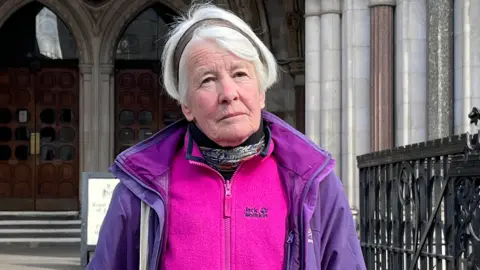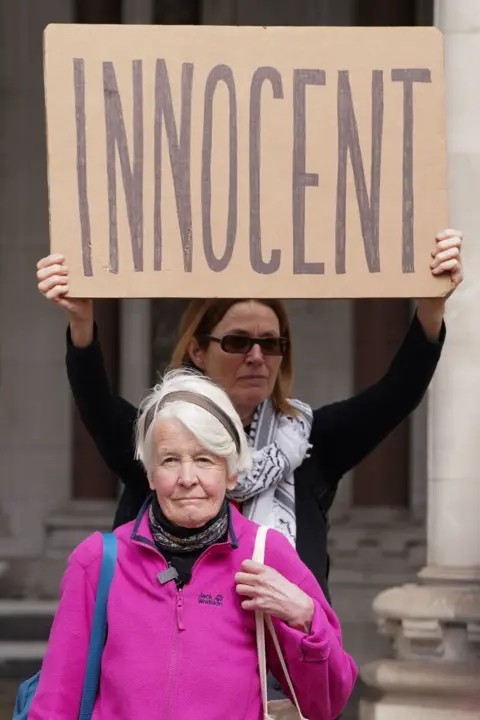Placard-bearer will not face legal action - judge
 PA Media
PA MediaA retired social worker says she is "very relieved" after a High Court judge ruled she will not face legal action for holding a placard outside a court ahead of a trial of climate protesters.
Mr Justice Saini refused the solicitor general's request to bring contempt of court proceedings against Trudi Warner, who is from Walthamstow, east London.
She was arrested after she held up a handwritten sign outside Inner London Crown Court ahead of a trial of Insulate Britain activists, on 27 March 2023.
It read: "Jurors you have an absolute right to acquit a defendant according to your conscience."
'Amazing support'
The sign referred to a plaque in the Old Bailey acknowledging a case from 1670, known as Bushel's Case, in which a jury refused a judge's direction to find the defendants guilty - a landmark in terms of the independence of juries in England and Wales.
Ms Warner told the BBC: "I'm very happy. I hope this is going to make a difference to other people.
"I have had the most amazing support. If I hadn't had the support, I would have been a wreck.
"I wanted this action to pave the way for others who are... more vulnerable than I am.
"I simply wanted jurors to know their rights and jurors to be confident enough to be able to stand up to judges who were, in my opinion, acting unlawfully."
 PA
PABarristers for Ms Warner argued her actions did not constitute an offence and that it was not in the public interest to take legal action against her.
Mr Justice Saini said he would not give the solicitor general permission to pursue proceedings against Ms Warner, as he delivered his judgment at the Royal Courts of Justice.
He said that Ms Warner had "accurately informed potential prospective jurors about one of their legal powers".
'Mischaracterisation'
The judge noted that there is a "tension which the law tolerates" between the principle of jury equity - which is the capacity of a jury to return a verdict according to conscience - and their duties in the oaths or affirmations they make, and their obligation to follow judicial directions.
"The proper forum for the solicitor general to address this concern is Parliament, not by way of contempt proceedings," he said.
"Overall, in my judgment, the claim is based on a mischaracterisation of what Ms Warner did that morning and a failure to recognise that what her placard said outside the court reflects essentially what is regularly read on the Old Bailey plaque by jurors, and what our highest courts recognise as part of our constitutional landscape."
Mr Justice Saini said Ms Warner's conduct did not amount to an "actionable contempt".
He said: "At no point did Ms Warner assault, threaten, block, accost or impede anyone's access to the court."
The judge labelled it "fanciful" to suggest that her conduct fell into the category of contempt, which is limited to threatening, intimidatory, abusive conduct, or other forms of harassment.
In written submissions, Aidan Eardley KC, representing the government, said Ms Warner had "deliberately targeted" jurors and encouraged them to "approach their task in a particular way".
Ms Warner's barristers told the court at the hearing last week that she had acted as a "human billboard" to advertise a "vital constitutional, if occasionally used, safeguard against unjust prosecutions".
Listen to the best of BBC Radio London on Sounds and follow BBC London on Facebook, X and Instagram. Send your story ideas to [email protected]
